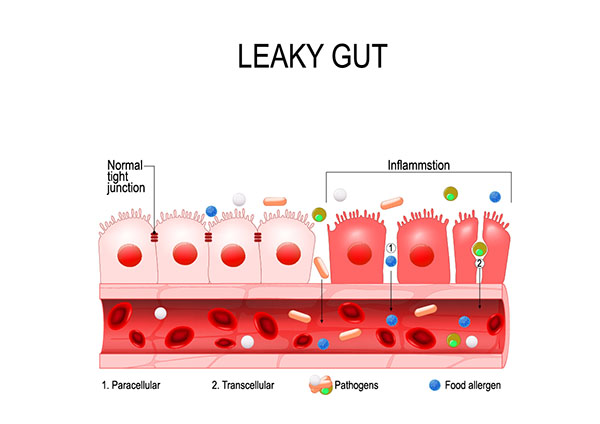Knowledge of the gastrointestinal tract has exploded in the last several years. We now understand that more than 100,00 microflora (bacteria, yeast, virus, lectins ) reside in our GI tract and work together within what is called the GUT BIOME. This biome has many important functions including digestion, absorption, and barrier protection to the outside world, and is a key player in immune health. We now know that there is direct communication between the GUT biome and the Brain influencing our mood and sleep.

Direct symptoms that involve the GI tract:
Indirect symptoms that we may not realize are related to our GI tract:
DYSBIOSIS is a general term used to describe an imbalance within the GI system. Causes of Dysbiosis include poor nutrition, certain medications, stressors, low stomach acid, low digestive enzymes, food allergies, viruses, lectins, excessive alcohol intake, genetic predisposition – to name a few. The result is a bacterial imbalance, barrier disruption, and immune disruption as well as those listed above.
The role of our stomach acids includes digestion of proteins, absorption of key minerals such as B12, calcium, magnesium copper, and zinc, and first-line defense against offenders such as H. pylori, bacteria linked with food poisoning, infections, and parasites. Today we use medications to lower stomach acid (antacids) at an alarming rate, with a potential long-term impact to the GUT Biome.
The GI lining is a single layer of cells responsible for the passage of essential nutrients and works as a barrier to harmful substances and organisms. This barrier or GI lining is impacted by many things including the use medications (antacids, chronic antibiotics, pain relievers such as NSAIDS), stress, poor diet, food allergens or intolerances, and environmental chemicals.

Irritable Bowel Syndrome is recurrent abdominal pain and discomfort (bloating) present for several months with a change in the frequency of stool and appearance of stool such as constipation or diarrhea. IBS may occur after an infection.
Small Intestinal Bowel Overgrowth termed SIBO involves bacteria normally found in the large intestine that translocates (moves) into the small intestine. Symptoms include extreme bloating after the ingestion of carbohydrates, constipation, and nutritional malabsorption. Integrative approaches to the management of SIBO include diet changes, specific probiotics for SIBO, correction of stomach acid balance, nutraceuticals rather than antibiotics, and specific measures to optimize vagal nerve stimulation.
Gastritis is an inflammation of the lining that can cause pain in the upper GI, nausea, or bleeding that may be caused by the use of some medications (NSAIDS, aspirin), excessive alcohol, H. Pylori, or other infections.
Crohn’s Disease, Ulcerative Colitis, Lymphocytic, and Collagenous Colitis characterized by chronic or relapsing immune activation and inflammation. Functional medicine looks for environmental triggers, genetics, the adaptive immune response, the Gut microbiome, and potentially an initiating event.
Gallbladder disease includes symptoms such as right upper stomach pain that may be worse after eating certain foods (fried, fatty). Functional approaches include diet changes, nutraceuticals, and gallbladder flushes.
Celiac and Gluten sensitivity and other foods can cross the GUT barrier stimulating an immune response, constipation, diarrhea, bloating, rashes, and more. Additionally, we see vitamin and mineral deficiencies in these conditions.
Innovative Health provides comprehensive programs targeted to the GUT BIOME our 5 R Program includes the following steps:
We utilize only state-of-the-art Functional testing by partnering with the best labs around the country.
Innovative Health LLC
111 Fountains Blvd
Madison, MS 39110
Phone:
(769) 241-3447